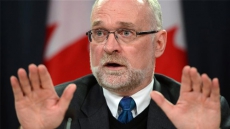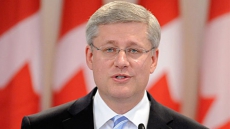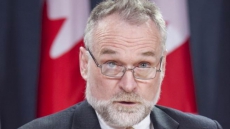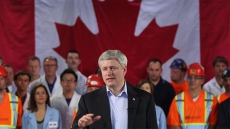OTTAWA — The Harper government is sending mixed signals about whether it intends to meet the Supreme Court's 12-month deadline for crafting a new law on doctor-assisted death.
Bob Dechert, parliamentary secretary to Justice Minister Peter MacKay, initially said Tuesday that 12 months is not enough time to deal with such a sensitive issue, particularly since an election will shutter Parliament for two or three months in the fall.
But he later backtracked, saying the government intends to meet the deadline. Dechert said he'd been speaking as a lawyer, not on behalf of the government, when he earlier predicted that the court would "most likely" grant an extension.
The question of assisted suicide is "amongst the most important, I think, that we'll ever have to deal with," Dechert told the House of Commons as he gave the government response to a Liberal motion calling for creation of a special committee to consult and report back by mid-summer with a proposed new law.
"I don't think that we should be rushed into doing something that's inappropriate — not taking the time to properly and carefully consider it and hear all opinions — simply because there is a 12-month imposed deadline."
The Conservatives will vote against the motion because they believe a committee is not the right venue for a broad public consultation, he added.
Pushed to explain how the government intends to proceed, he said a public consultation process will be launched soon and could involve use of online discussions and public meetings. That will be followed by introduction of proposed legislation, which would then be examined through the normal committee process.
Earlier this month, the Supreme Court struck down the ban on doctor-assisted dying and gave Parliament a year to draft a law that recognizes the right of clearly consenting adults who are enduring intolerable physical or mental suffering to seek medical help to end their lives.
Vancouver Liberal MP Hedy Fry, a medical doctor, argued that seeking an extension will mean asking affected Canadians "to wait longer than a year in pain and suffering" for Parliament to finally act on the matter.
Kicking off debate on the motion, Liberal Leader Justin Trudeau said parliamentarians have a duty to respond to the court's ruling and can do so within the 12-month time limit if they get the ball rolling immediately.
"There is no advantage to delaying debate," Trudeau said.
However, the governing Conservatives may see an electoral advantage in delaying until after the election any action on an explosive issue that is likely to divide its caucus and its support base.
During Tuesday's debate, Dechert's comments reflected an obvious level of Conservative discomfort with the court ruling.
He enumerated what he called the many risks involved in legalizing doctor-assisted dying, including elderly or disabled people being pressured by family or doctors to prematurely end their lives or people opting for doctor-assisted suicide on the basis of faulty diagnoses.
"Adult children who may be eager to get at their parent's estate could conceivably try to influence their parent to choose assisted dying," he said.
"I think we need to be very, very cautious about how we proceed in this area."
Delegates to the Liberal party's national convention last year supported a resolution calling for the legalization of doctor-assisted death.
Trudeau revealed Tuesday that he personally believes the court was right to strike down the ban on doctor-assisted suicide, based on his own experience when his father, former prime minister Pierre Trudeau, was dying.
Trudeau has in the past confirmed that his father, who had also been diagnosed with early stage dementia, chose not to receive treatment for advanced prostate cancer.





